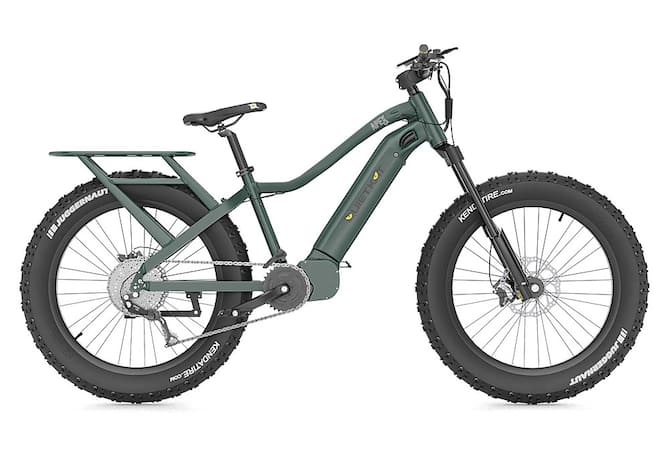What Is the Difference Between a Step-through E-bike and a Step-over E-bike?

carousel
Commuting with step-through e-bikes and step-over e-bikes
Differences between a step-through e-bike and a step-over e-bike
A step-through e-bike has a curved frame that either has a very low top tube or no top tube at all, but still has the prominent slanted down tube that connects the handlebars to the pedal area. This leaves out the top portion of the triangle shape that most bicycles have. Originally designed to accommodate wearing a dress while riding on regular bicycles, the step-through design has increased in popularity over the years due to its comfort and style.
Step-over e-bikes have frames that are designed with a more traditional triangle shape, featuring a slanted down tube that connects the handlebars to the pedal area and a horizontal top tube that connects the seat post to the front handlebars. This sturdier, more geometrically sound design is usually constructed with thinner and lighter materials also prove to be more durable and can handle all sorts of terrain.
Benefits of riding a step-through e-bike
The most noticeable benefit of riding an electric step-through bike is how easy it is to get on and off. Similar to how a moped is designed, the slanted step-through frame conveniently lets the rider move their leg over to sit comfortably on the bike seat. This is extra beneficial for riders who are not very flexible or might have limited movement due to joint or muscle issues. Shorter riders are also able to mount and dismount a step-through e-bike with ease.
Step-through e-bikes typically have handlebars that are positioned slightly higher than the handlebars on a step-over bike, which along with the slanted design, provides the most upright riding position. This helps maintain a good posture while riding, causing less stress on your neck and back.
Getting around and running errands on a step-through e-bike is also ideal. The extra space the slanted frame creates allows for extra cargo room, which can be safely secured with mounts and carrier bags. A rider can casually carry around items without being restricted by a step-over design. This extra space is also great for accommodating riders who are wearing clothes that aren’t traditionally worn when biking, such as dress clothes and dresses. Because of this, the step-through model is generally known as the best type of e-bike for commuting.
Benefits of riding a step-over e-bike
Step-over e-bikes provide a smooth and balanced ride thanks to their lightweight frame. They are also easy to handle and control. This gives you options of where to ride while also helping extend the e-bike’s life. Step-through e-bikes are limited to flatter, smooth surfaces for peak performance, but most step-over e-bikes can be ridden anywhere, including offroad trails with rougher terrain. Plus, the lightweight frame is easier to carry and transport to any destination of your choice.
If you’ve ever wondered how fast are electric bikes, the step-over e-bike is usually the answer. Both the geometric shape and lighter weight of the frame also help most step-over e-bikes achieve higher speeds than a step-through model. Some states require you to always wear a helmet when riding an e-bike, but having a helmet as well as pads is particularly important wherever you live when you are riding at high speeds.
Depending on how much it is used and the overall upkeep, step-over e-bikes usually last longer than the step-through variety. Again, the sound construction and shape contribute to the bike’s overall durability. Since many e-bikes can be pricier than a regular pedal bike, getting the most out of it and making it last throughout the years is highly beneficial.
Disadvantages of riding a step-through e-bike
Because of their design, step-through e-bikes are heavier than step-over models. This not only may cause issues for transporting the bike, but may also limit how fast it can go. Step-through e-bikes are slower than step-over e-bikes and do not accelerate as quickly because of their bulkier frames. So, they might not be the best e-bike for riders who like packing up their bike and going on longer, faster-paced treks.
The slanted design of a step-through e-bike limits some of the custom additions a rider can add to it. The bigger frame cannot always support common accessories, such as water bottle holders, bags and carriers and bike locks.
Step-through e-bikes are also not as good on uneven terrain. They are designed to provide an ideal riding experience on flat surfaces and solid ground, such as most paved bike paths, city streets and sidewalks. If you intend on doing some off-roading, a step-over e-bike might be the better option for you.
Disadvantages of riding a step-over e-bike
The sleek, geometric shape of the step-over e-bike has many advantages, but it also compromises the comfort of the bike. A rider is in a hunched over position in order to properly steer the e-bike, which can cause stress and discomfort. Furthermore, new step-over e-bikes are usually equipped with a firmer seat that can become uncomfortable during longer rides. You can, however, customize your own saddle any way you’d like after purchasing it.
Although the overall step-over frame is more durable than a step-through frame because of its design, the materials it is constructed from are both slimmer and more delicate. This can be disadvantageous in the event of a bad crash or if the e-bike is accidentally dropped while it is being transported.